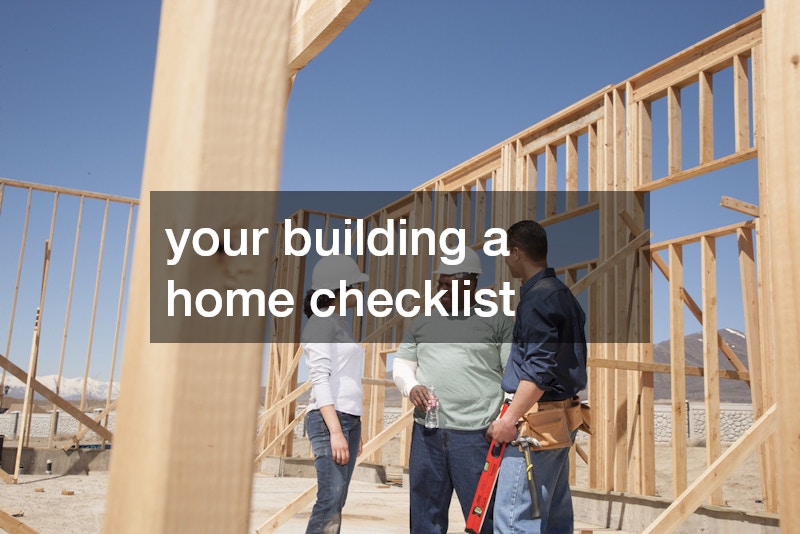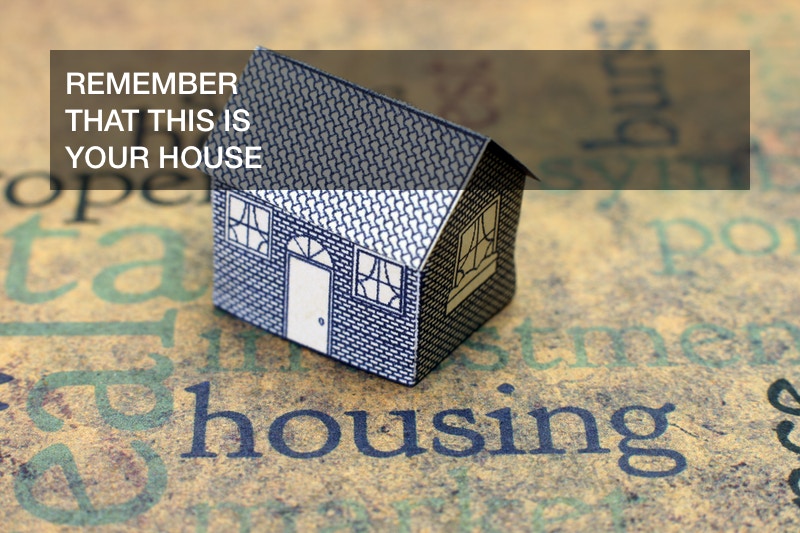
Updated 9/29/24
Nearly everyone has ideas for home building. Most people conceptualize their dream home at some point in their life. But, what happens when your conceptual house plans turn into the opportunity to actually construct the house of your dreams?
When you go from dreaming of building a house to doing so, you need an architecture design plan first. You’ll have two options – hiring an architect, then home builders, or hiring a design and build company that employs an in-house architect. Many homeowners report having a better experience with a design and build firm. These professionals provide all home design, building, and construction services in one place, which streamlines the process and ensures a positive experience for homeowners!

Once you’ve checked off those first two items on the building a home checklist, you can proceed with the rest of the list. Your general contractor (GC) at the home building company helps you choose materials appropriate for the design you want. The GC also handles hiring subcontractors for jobs that the company rarely takes on, such as swimming pool construction. Keep reading to learn more about the tasks necessary to construct a home.

If you plan on building a house in Las Vegas you want to be sure that you have all the information that you need to not make any missteps in the process. About 42% of house sales in 2012 were to first time homebuyers, and many of them choose to build.
If your plan is building a house in Las Vegas one of the best things you can do is to get really familiar with the building code and local laws that affect new home construction. Building a house in Las Vegas is a great way to get the custom home you have been dreaming about, as long as you are well prepared for the process.
It Is a Process
A lot of times when you pass a new house it seems like it literally was built in a couple of weeks, however, you can just about guarantee that it did not spring up in a week or two. Building a house in Las Vegas on average takes between four and seven months to complete.
A residential building contractor can give you a more specific time frame for your particular project. In some cases the project can be completed much sooner than in other cases. For example, if you are building a larger home with customizations, the sheer size of the project can take longer, than if you are building an average size home with minimal customizations.
Part of the process is ensuring that all the permits are in place. Permits are required before you ever start building a house in Las Vegas. Of course, typically, permits and contact with inspections is something that your general contractor will manage, but it is a part of the process.
The best way to approach building a house in Las Vegas is to not rush the process. You want to ensure that everyone on the project has the time to manage their part of the project with a focus on quality. Stressing out the plumber to rush through the plumbing installation can result in errors in judgment and low quality results.

Working closely with your GC, and keeping open lines of communication will ensure that you know where the project stands. One of the biggest mistakes someone that is building a house in Law Vegas or anywhere is trying to rush the project or bully workers into moving faster then they are able to.
Expect Some Hiccups
While there are not a lot of statistics around that give your numbers about how many home construction problems run into some problems, the smart money, says a very large percentage. It is far better to plan of problems and not experience any, than it is to plan for smooth sailing and run into a problem.
Some of the most common problems during construction include:
- Permit delays. If all the ducks are not in a row when it comes to drawings and other necessary requirements it can be hard to get a building permit. Again, this is not something you as a homeowner need to worry about, but it can cause delays.
- Public utility delays. If your site is not in a development that is already outfitted with power and other utilities. You are at the utility companies mercy. Power, water, and other services can hold up a project.
- Weather conditions can hold up your project. Heavy rains, cold wet weather, or extreme heat, can put a damper on the project.
- Material availability. If you must have that rare travertine marble from Italy, you may be waiting a while to have those floors installed. Material delays are common delays.
Every part of your project can be affected by the weather. For example, local roofing services that your GC has subcontracted to may not be able to get the roof in place for a week or more if there is a snap of wet weather.
Residential roofers and other skilled crafts people are often delayed because of weather and the risk of safety inclement weather can cause. Of course, in cases where concrete needs to be poured, wet weather or cold weather can cause delays.
While most delays and small obstacles can be over come pretty quickly, there are cases where a project can be delayed by a month or more. In other words, if you absolutely have to be in your new home 5 months from now, building a new house in Las Vegas cannot guarantee that you will be able to.
There is one other thing that will cause your project to come to a screeching halt, a problem with your new home financing. This is an area that you need to stay on top of. Many potential homeowners wind up with sticker shock at the end of the project because they are writing a check at the closing table that they did not expect to.

Every time you make a change during the project whether it is changing flooring material, or adding in backyard landscaping to the overall cost, you are ringing up the charges. Before you make any changes during the building phase, be sure you are clear on the cost to make the changes. Staying within in your approved financing budget will ensure that you do not wind up running out of money.
What Are Exclusively Your Responsibilities in the Process?
You have a list of responsibilities when you are building a home that no one can manage for you. Of course, you need to secure the financing. You need to pick the lot where your house will be built, then you need to do a site evaluation to ensure that you can build on the site.
Once you have your site picked out, you will need to meet with the residential builder to decide together where the house will go, what vegetation needs to be cleared first, where the driveway will go, and to make other site decisions. Depending on which builder you are working with, you may or may not have to contract someone to grade the lot and clear it.
Next up, you pick the home that you want built, and decide on the finishes. You will have options for everything from garage doors to plumbing fixtures. The builder will have some options to choose from. The builder will present to you:
- Trim options
- Window and sliding glass door systems options
- Paint, cabinetry, flooring options, and more
You have a lot of decisions to make, and keep in mind, while many decisions can be backed out of and changed, many cannot without a great deal of expense. For example, you choose burgundy trim for the outside of the house, but after seeing the first shutter go up, you hate it. You can change the trim color, but you may have to pay a hefty sum to do it if all the supplies have been ordered.
It is important that you really consider the options that you choose so you do not have to pay to make the changes or worse yet, live with choices you are not happy with. An experienced builder will talk you through this part of the process.
Choosing Your Builder
One of the most important parts of building a house in Las Vegas is choosing your contractor that will build your house. Do not make the mistake of going with the first builder that you meet. The rule of three is a good rule to follow in this case.
Contact three builders and get three price quotes for the project. You should not shop by cost alone. A lot of people make the mistake of using pricing as the only criteria when they are choosing a builder. In many cases, the lowest price does not mean the best value.

Here are some guidelines for choosing a builder for your project:
- View the builders portfolio. Every builder has a portfolio of the projects they have completed. Learning more about the builders building style can help you to choose the right builder.
- Make sure they are a match for your project. Builders have different styles, and different skill sets. You want to be sure that the builder you choose has the skill set to construct the type of home you want.
- Look for the added value. Added value options can be tremendous cost savers. Look for the builder that delivers the added value to the project. It can be something as simple as the builder covering the cost of commercial pest control for the first treatment.
The only way to ensure you are getting the best value is to compare your options. Going with the first builder that comes along is not the best way to get the ROI that you want out of your investment.
You Can Negotiate
Not enough potential homeowners negotiate pricing with the builders. Nothing is set in stone when it comes to pricing. Asking for a lower price or an upgrade in materials for the same price is allowed when you are building a house in Las Vegas.
Many people do not negotiate for better pricing and better value because they do not realize that they can. Every builder has a markup margin that can be negotiated down a bit. If you want to save or are willing to pay the price but for a higher grade material, than you should let the builder know that. It may work out in your favor. In the worst-case scenario, the builder says no. Nothing ventured nothing gained.
Negotiating between builders when you are doing your comparison can be a great way to save money and get a better quality home for less. For example, ABC contracting has delivered a great quote but they only offer laminate flooring at the price, CDF contracting is charging a bit higher but they offer higher quality flooring options, tell ABC contracting you would love to give them the job but the flooring is a deal-breaker. You may get the answer that you are hoping for.
Don’t stop negotiating once you have hired the contractor, keep that ball rolling. You may get your lawn seeded for free, or get some little upgrades here and there if you are willing to ask for it. Again, the worst thing that could happen is all you hear is no.
You May Need a Type of Homeowners Insurance Policy Before You Close
You may need a limited homeowners insurance policy while your home is being built, then you will need a full homeowners insurance policy once you close on the new home. If you are building a house in Las Vegas, whether or not you need a limited insurance policy largely depends on where your financing comes from. It is important that you ask your lender if you need to have this type of policy in place.
Building a house in Las Vegas can get expensive, but you can keep costs down on everything from insurance to the build itself by doing some leg work and comparing your options.
You Are In the Drivers Seat

Throughout this process keep in mind that you are in the driver’s seat. If you do not feel like things are going the way they are supposed to if you have questions about extra charges, or you feel the GC is not communicative enough, say something.
One of the biggest problems with building a house in Las Vegas as it turns out is communication issues. It is highly recommended that if something is happening that you are not happy with, that you express it as soon as possible. Waiting to say something or letting the situation fester is not good for anyone in the situation.
If you give the builder an opportunity to address a problem early on they will. If you let the problem sit and not say anything then no one can take care of it. This is your home, your money, you are in the driver’s seat and you can control the situation, but you have to speak out.
If your builder is not responsive via telephone, send an email, if you still do not get a response, go up the ladder until someone does. Taking charge of the situation and making sure communication stays open will help the project to move forward in a positive direction with everyone on the same page.
As a final note, make sure you get every promise in writing when building a house in Las Vegas. Unfortunately, verbal commitments rarely hold up in court. Anything that your builders say they will do, ask them to put that in an email to you. Having a paper trail of everything promised is always a good idea and just keeps everyone honest.
Building a house in Las Vegas is a process but it does not have to be a stressful process. Choose the right builder and keep those communication lines open and you will have a beautiful home and a smooth process.


